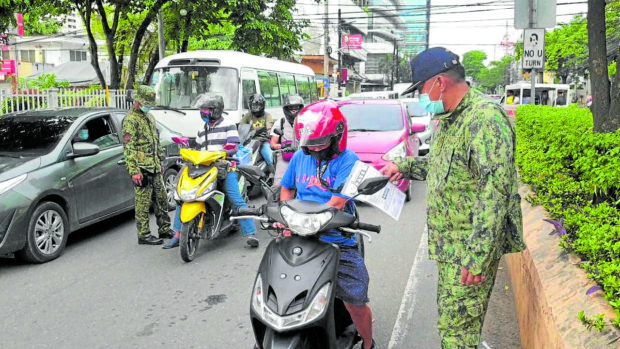Cebu virus cases drop due to strict lockdown

CHECKED Policemen make sure only authorized persons are on the streets of Cebu City on Sunday. —DALE ISRAEL
CEBU CITY, Cebu, Philippines — While Cebu remains a hot spot for new coronavirus disease (COVID-19) infections, researchers studying the outbreak noted a downward trend in the number of transmissions on the island after Cebu City, the economic center, was placed on strict lockdown on June 16.
Experts from the University of the Philippines (UP) and University of Santo Tomas (UST) said the enhanced community quarantine (ECQ) enforced in the city helped slow down the doubling rate of infections in Cebu from a high of 2 percent to 1.14.
Aside from stricter quarantine protocols, they attributed the development to the scaled-up testing, tracing, isolation and treatment strategies implemented by the national and local governments, and supported by the community.
“While Cebu remains a high-risk area with a high number of community transmissions, the interventions of the national and local governments, in cooperation with the community, has resulted in a significant reduction in the transmission of the virus all over the province,” said the researchers in the study “COVID-19 forecasts in the Philippines: NCR (National Capital Region), Cebu and COVID-19 hot spots as of July 10,” released on July 16.
Not time to relax
“In Cebu, the strategy to contain the virus has been working. Cebu province has been able to contain the surge and is on the way to flattening the epidemic curve. For Cebu City, we recommend the continuation of the strict quarantine strategy to sustain the gains already achieved,” they said.
If an ECQ or modified ECQ status is sustained in Cebu City until July 31, Cebu will be on “a trajectory toward flattening its epidemic curve,” the study said.
The researchers also recommended the establishment of more community quarantine and isolation centers and for health officials and hospital management to continuously monitor the capacity of medical centers to handle COVID-19 patients.
“Hospital capacity would benefit from the establishment of more isolation facilities within LGUs (local government units) as mild cases of COVID-19 can use these facilities instead of going to the hospital,” they said.
Mayor Edgardo Labella said he hoped to sustain the gains of the city in the past weeks.
‘Quite glad’“I’m quite glad [by the researchers’ findings]. We have to coordinate with barangay officials and our national leaders so we will be successful in this fight,” he told the Inquirer by phone.
Labella reiterated his desire for the city to transition from modified ECQ into a more relaxed general community quarantine next month so as to allow more businesses to reopen and revive the local economy severely affected by strict restrictions.
Even if the quarantine status is relaxed, he said, some subvillages and households with high numbers of COVID-19 cases would still be placed on lockdown.
“We will never be complacent. We will really see to it that we will be relentless and strict in implementation of the minimum health requirements so that our cases won’t rise again,” the mayor said.
As of Saturday, Cebu had 13,302 COVID-19 cases, with 650 deaths and 5,999 recoveries, according to the Department of Health. The bulk of the cases came from Cebu City with 7,986, including 409 deaths and 4,367 recoveries. INQ
For more news about the novel coronavirus click here.
What you need to know about Coronavirus.
For more information on COVID-19, call the DOH Hotline: (02) 86517800 local 1149/1150.
The Inquirer Foundation supports our healthcare frontliners and is still accepting cash donations to be deposited at Banco de Oro (BDO) current account #007960018860 or donate through PayMaya using this link.